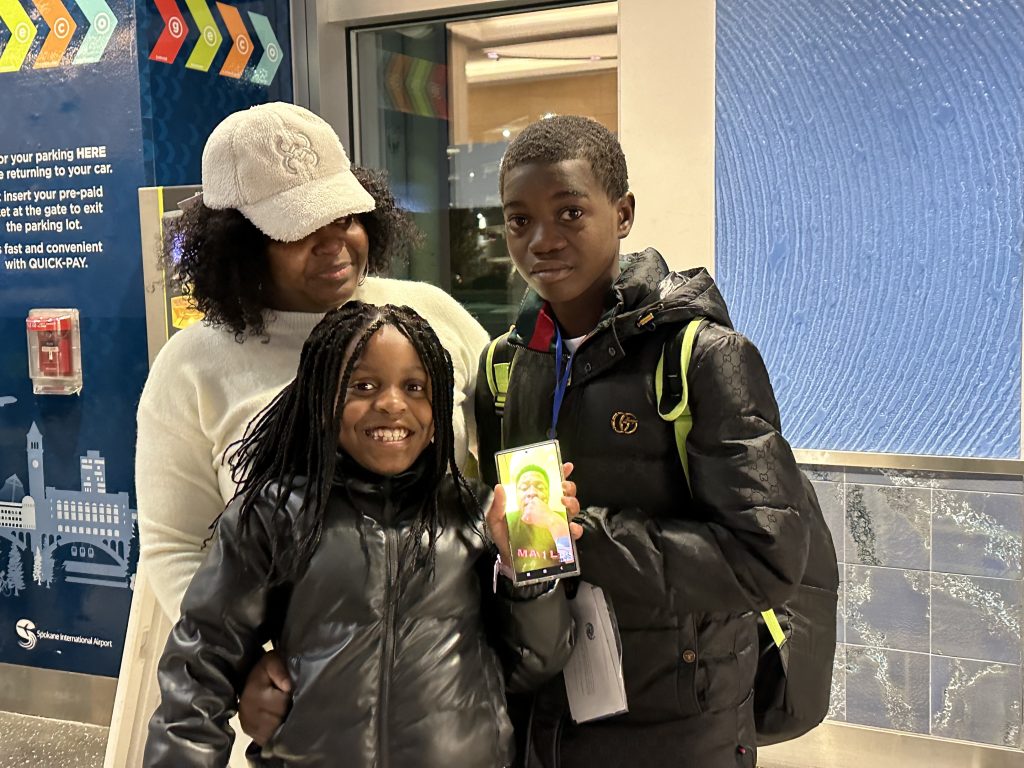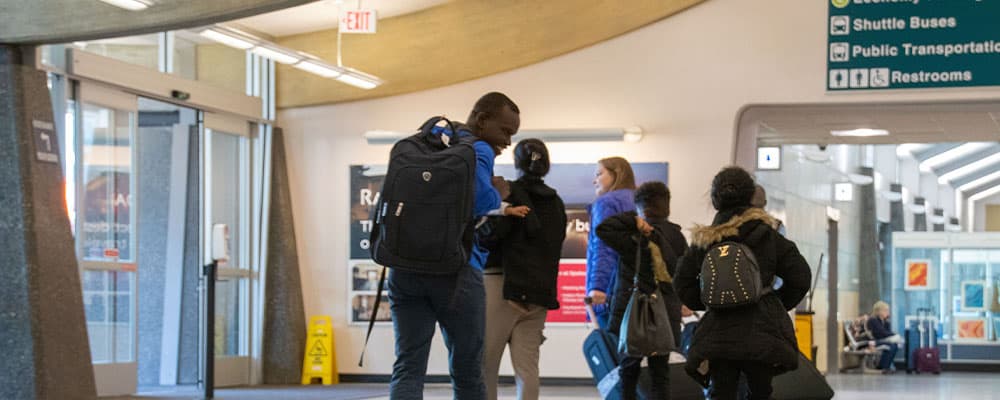While he was still a long way off, his father caught sight of him, and was filled with compassion. He ran to his son, embraced him and kissed him.
Luke 15:21
Micah Goris, World Relief Spokane pre-arrival coordinator, had the pleasure of witnessing a family reunification recently. The mother was notified about three months in advance that her child would be arriving. This gave her time to prepare.
“When I went to their house, she had a bunk bed all ready,” Micah said.
While every arrival is exciting and joyful, the arrival of a minor takes things to a whole new level.
“The mom gasped when she saw him come down the escalator,” Micah recounted. “And then she was really excited to get over there, but the security guard wouldn’t let her get past. She’s waiting there already starting to weep. He runs over and hugs her.”
Overcome with emotion, the mother knelt and cried as she clutched her son’s feet. She wanted to surprise her daughter, so she had not shared the real reason they were at the airport.
“She didn’t realize what was going on until about five seconds after they got together.” Micah laughed. “It was really funny.”
“Is this a dream?” said the young girl to her brother. “I thought you were going to be an old man!”
Hearing this, her mother laughed. He was a teenager, but the last time she had seen her brother in person was six years earlier.

This beautiful picture is an example of a minor case: a refugee under the age of 18 who is traveling to another country for resettlement without the guardianship of his parents.
Even though more than half of World Relief’s clients are children, minor cases are rare. In the past fiscal year, nearly 500 people were resettled by World Relief Spokane; 291 were children. In last year’s caseload of 365, only one case was a minor case.
Refugee families are sometimes split up during the chaos surrounding conflict and war. With limited communication, they sometimes lose contact completely. They may not even know if their relatives are still alive.
As a result, a minor may arrive at a refugee camp, apply for refugee status and get resettled without his or her parents.
“Oftentimes, they don’t even know where their parents are until they get here. When they get here, they have access to the internet, access to community, where they can see where their family is,” explained Jordan Bemis, resettlement director.
Unaccompanied minors coming to Spokane – but not reuniting with parents or relatives – enter the foster care system through Lutheran Community Services. Most of the cases at World Relief involve a minor who is traveling to meet up with a parent or a distant relative who has already been resettled.
The process of reunification between a relative and a minor begins when the family member fills out an affidavit of relationship. The affidavit connects the minor to the adult’s case and speeds up the process of resettlement for the child.
The child may join the family after DNA testing, interviews, medical appointments and other vetting procedures. According to Jordan, most minor cases at World Relief Spokane arrive after a wait time of one to three years. The average time for processing minor cases, however, is about seven years worldwide.
The delay is incredibly tough on the family. “People don’t realize how difficult that is,” Jordan said. “You know your child is somewhere, but you can’t get to them.”

Minors cannot legally travel alone, so an escort from UNHCR accompanies the child. After verifying the identity of the individuals with the case manager and handling paperwork, the family goes home.
Even though there is great joy when a child is reunited with family, that does not negate the difficulty of welcoming a child home after years of separation.
“The parents and the child have to work on that relationship,” Jordan said. “Some minors we work with are 17 years old. I mean, they are almost adults. And they’ve been on their own for 3-4 years.”
“It can be hard.”
World Relief works to make sure the introduction of the new family member goes as smoothly as possible. Over the course of three months, the case manager makes several home visits to check on how the family is adjusting.
These visits also ensure the safety of the child in case there is a possibility of abuse, although Jordan confirms that World Relief Spokane has never needed to report such issues.
“I have never had a bad situation.”
On a related subject, Jordan emphasized the importance of the new youth program at World Relief, as well as similar programs at Thrive International, IRC and Manzanita House.
“Refugee kids are going through, and have experienced, things that no other youth in America has experienced. It would be easy to feel alone as a kid.”
The developing youth program at World Relief seeks to bring these individuals together to support one another and develop relationships with those who have shared experiences.
“It’s important socially and mentally to give them a safe place.”
